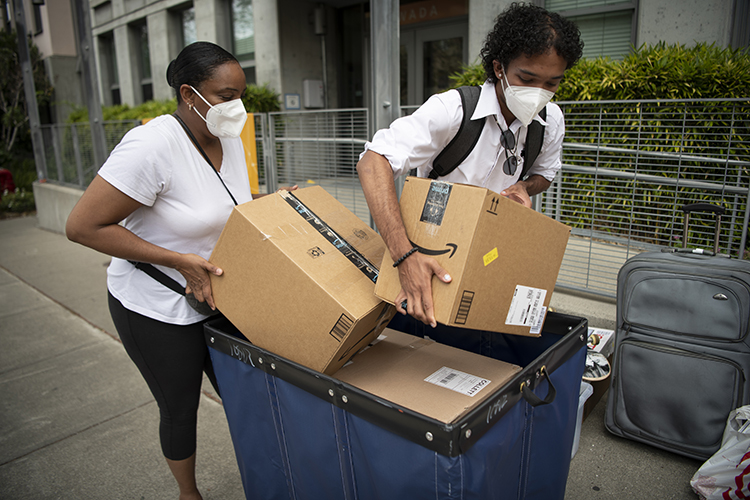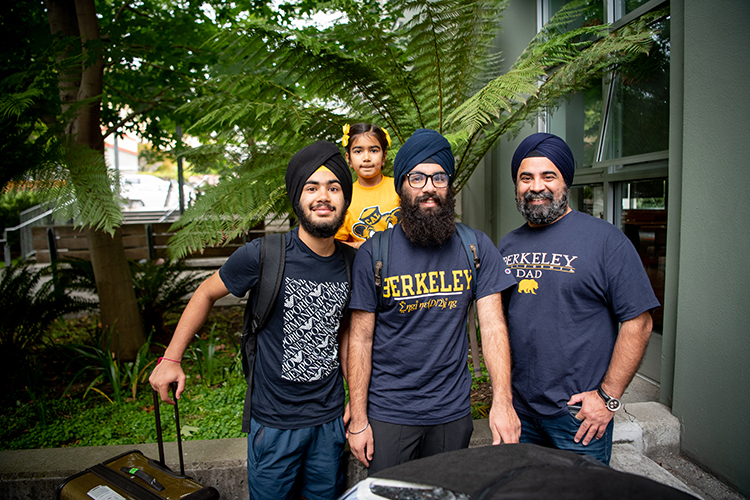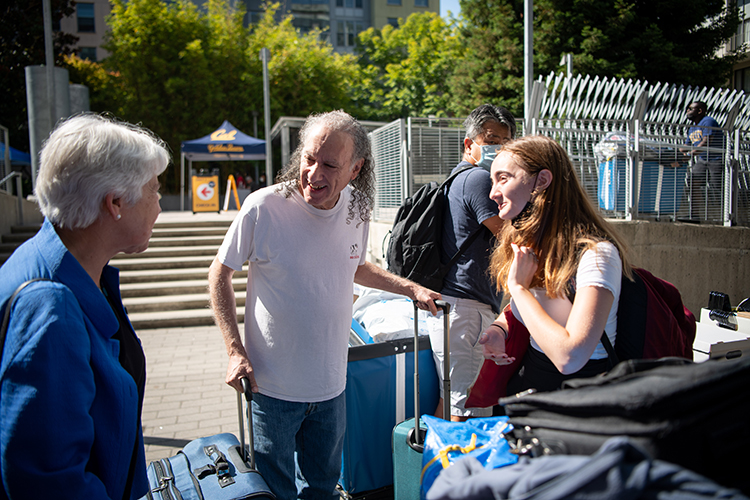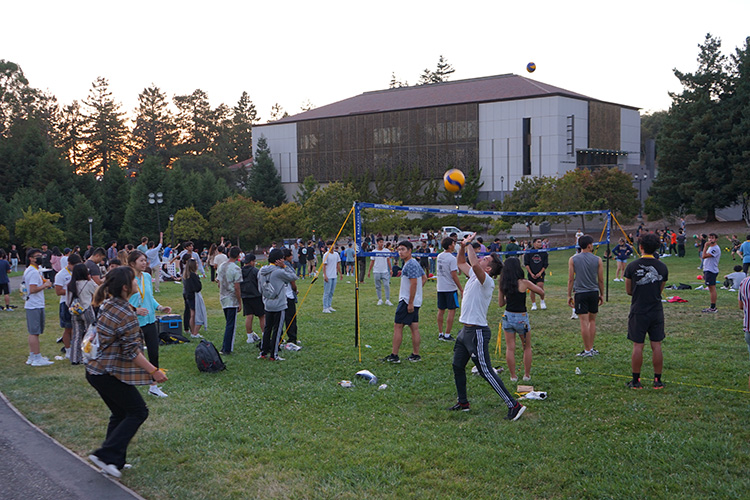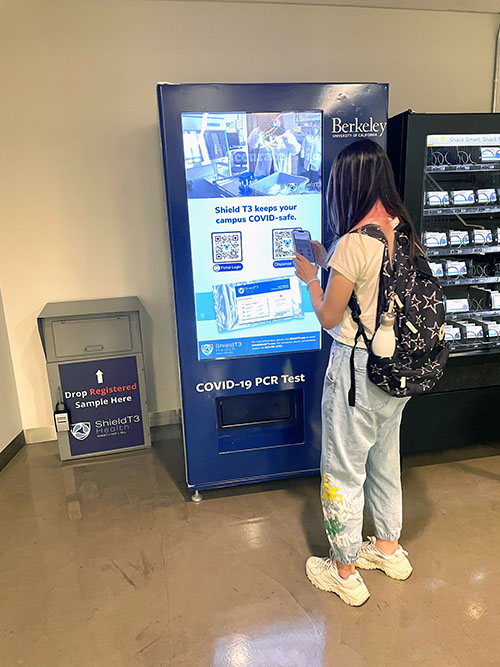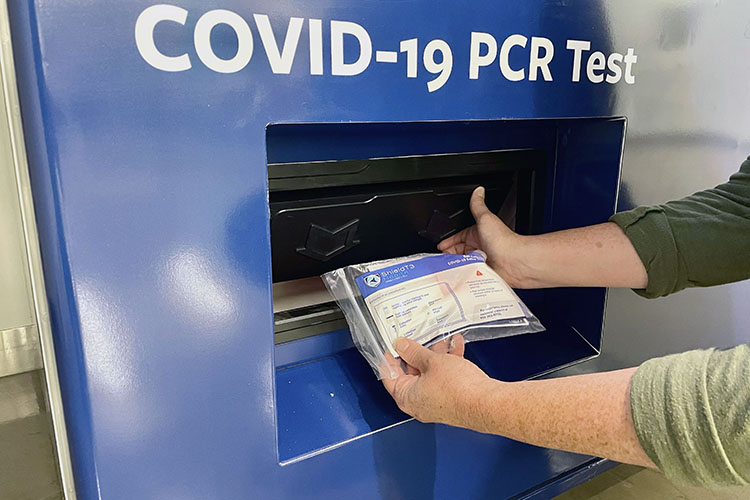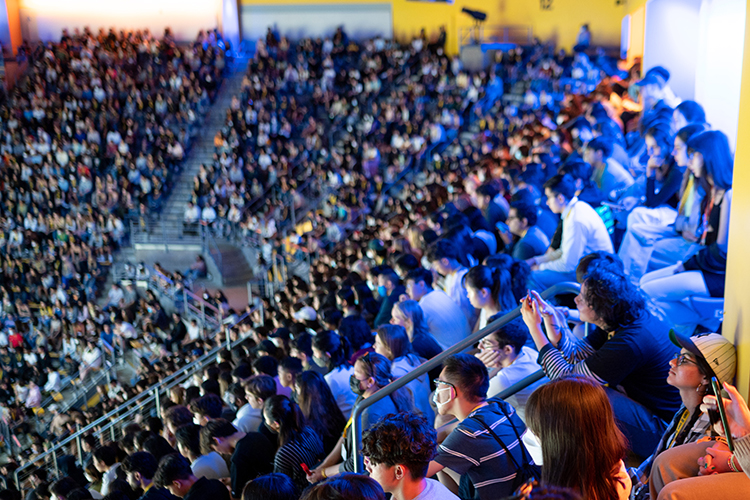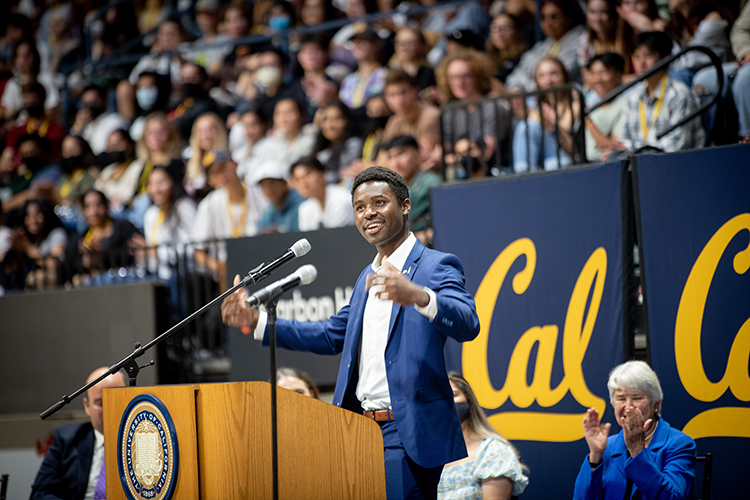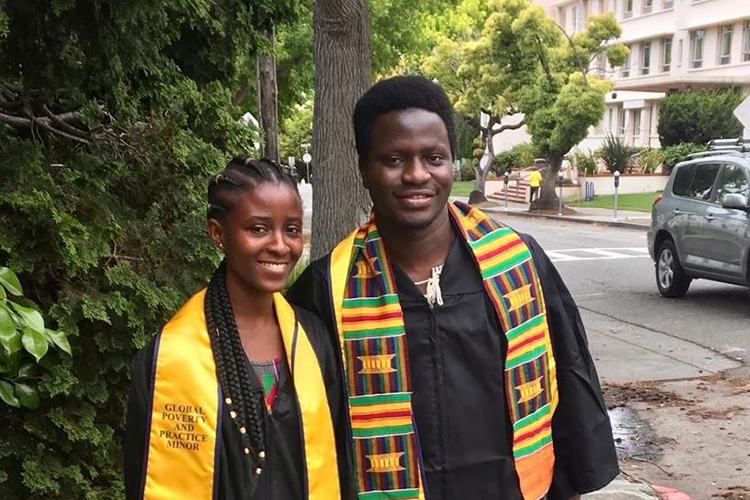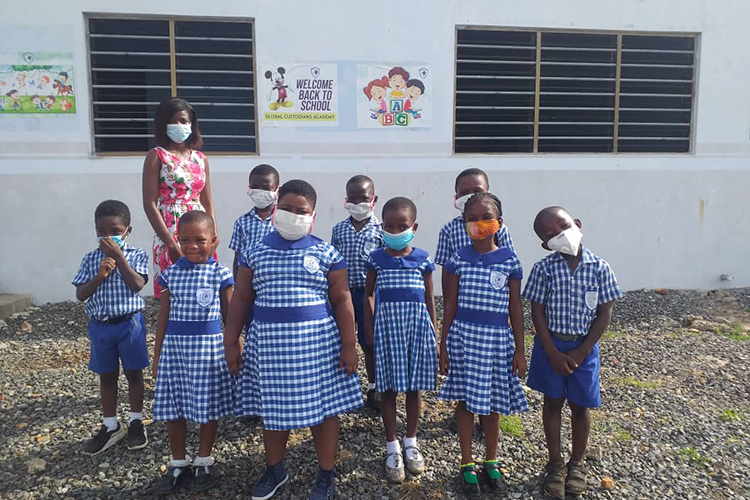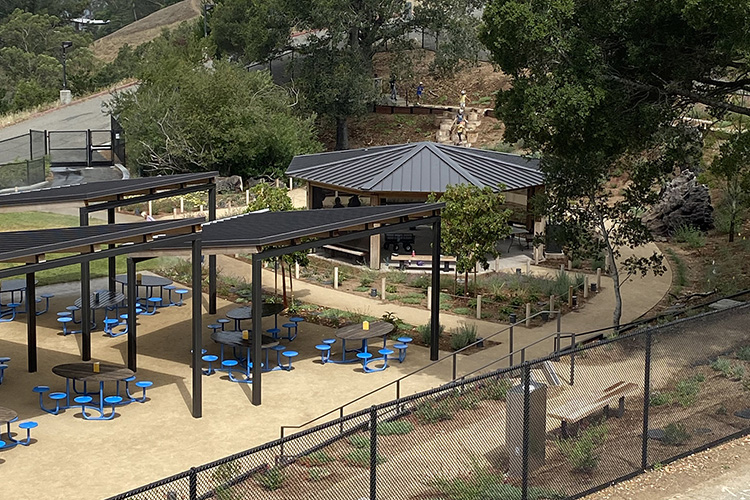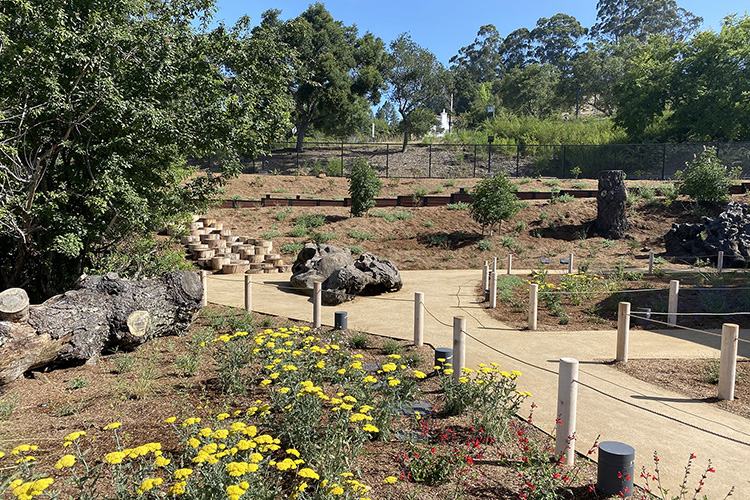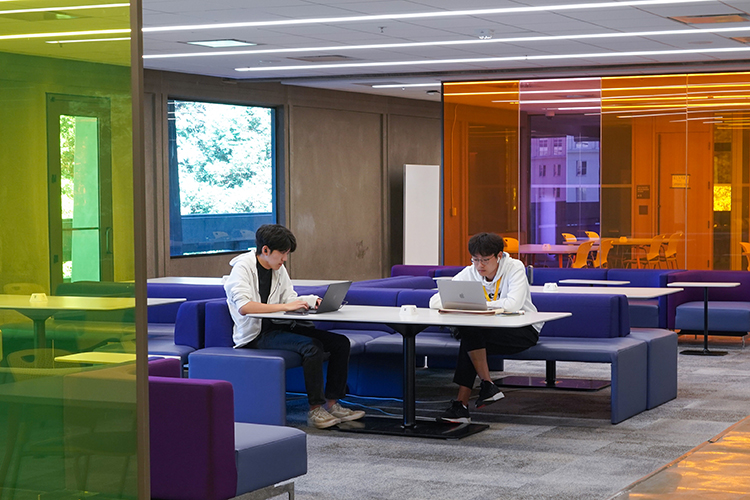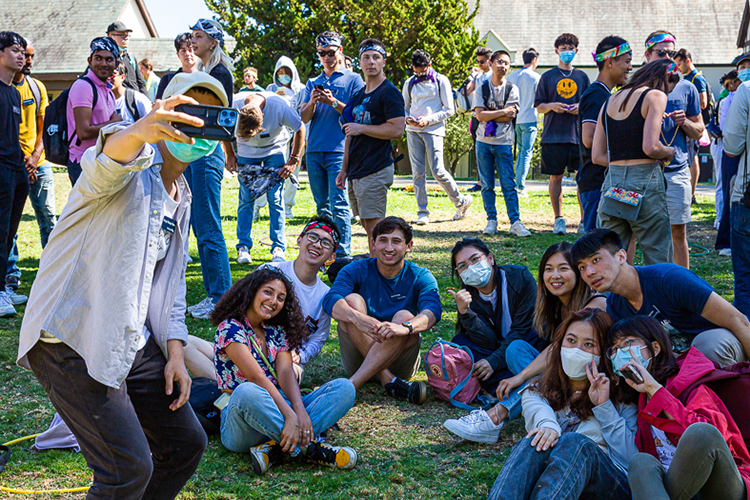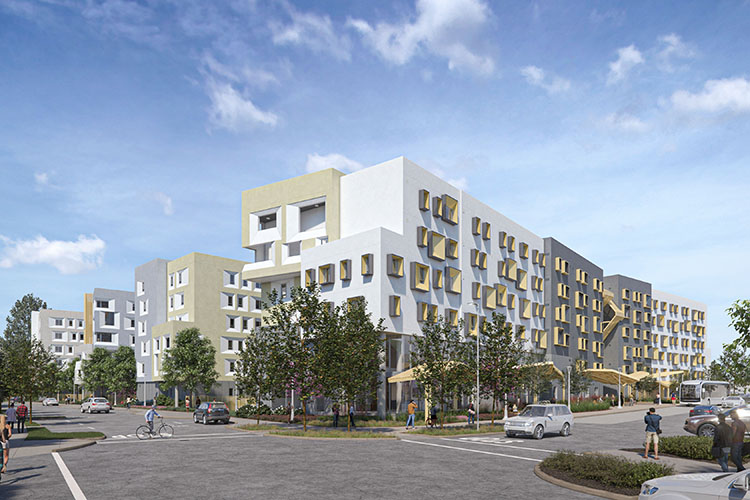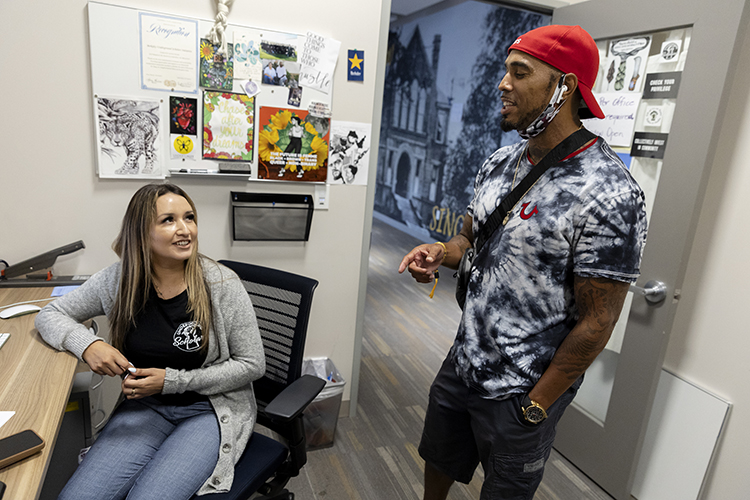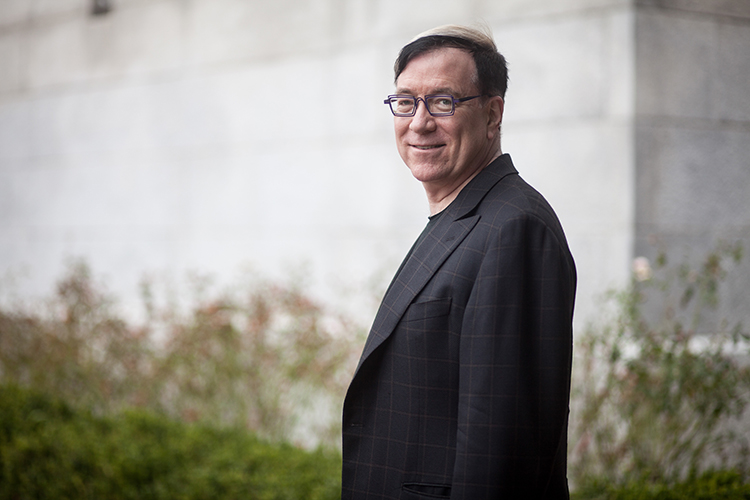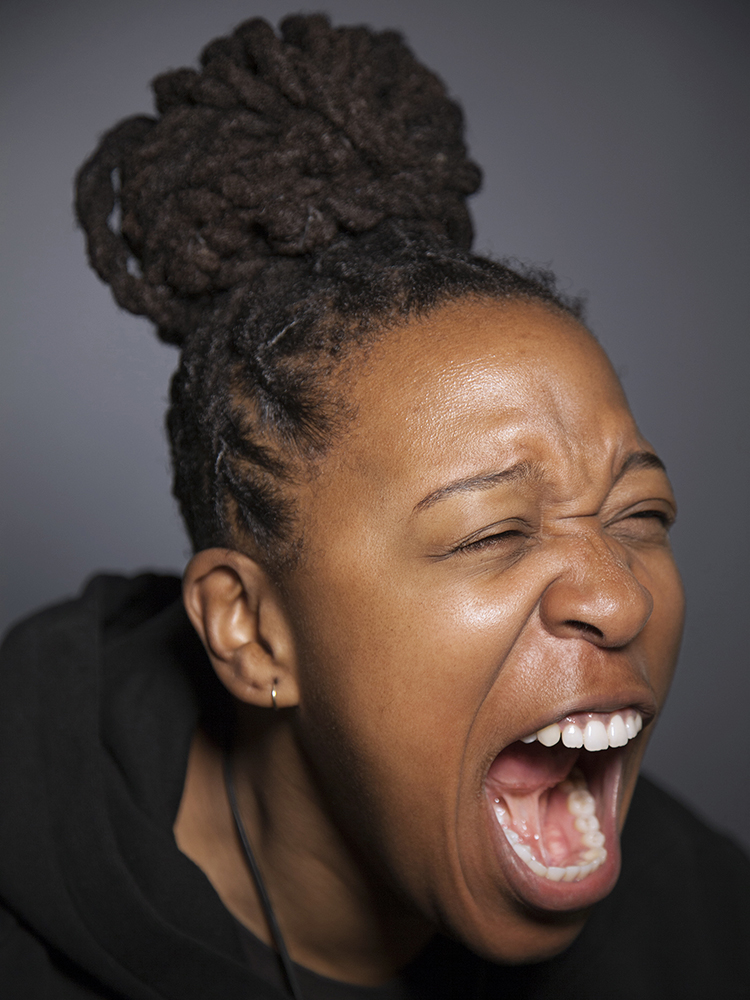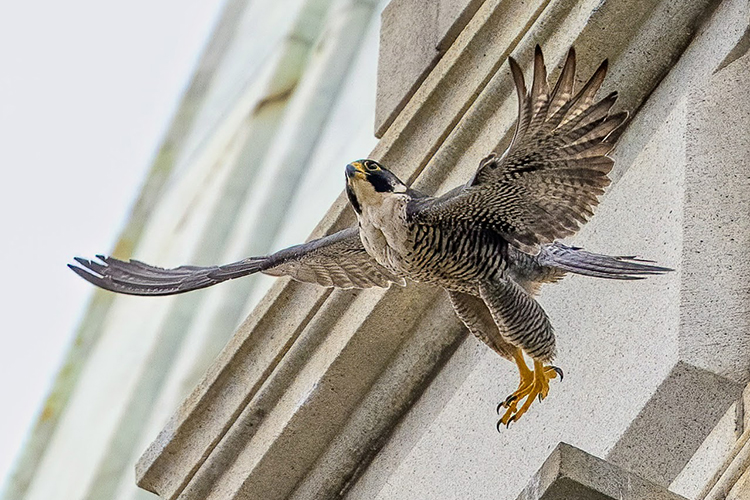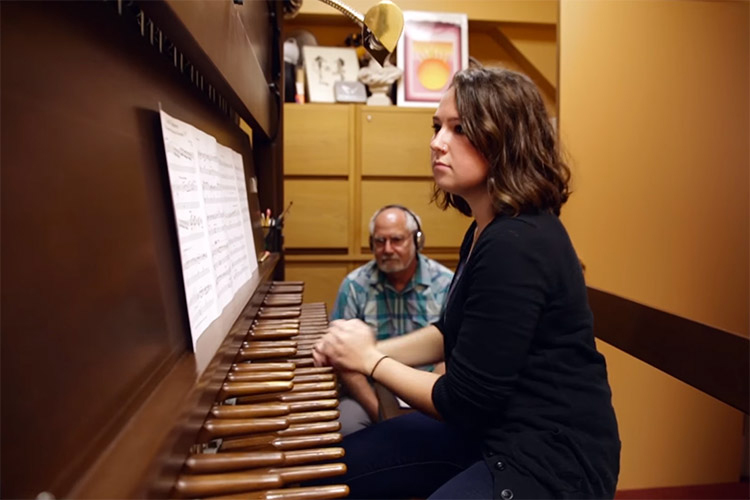No shortage of good news as fall semester 2022 begins at UC Berkeley
The new academic year begins with more financial and state aid for students in need; anniversary celebrations for Title IX, Big Game and "The Play;" free art for your walls; a new nature lab to retreat to above campus and a graduate student housing project.

August 24, 2022

A game of spikeball among a group of new UC Berkeley students on Memorial Glade eases the transition to the start of fall instruction, which begins today, Aug. 24, 2022. (Photo by Brittany Hosea-Small)
The reopening of popular Moffitt Library, vending machines dispensing free COVID-19 tests, the 50th anniversary of Title IX, the 125th Big Game, unprecedented state funding for students from several historically excluded communities, an expanded Basic Needs Center, and a visiting Chicago artist who will photograph women screaming in rage are highlights of the start of UC Berkeley’s new academic year.
Anyone walking across campus will notice another novel sight: A sea of students — mostly without masks — breathing in the late summer air between classes, which begin today. They’ll then head indoors, where face coverings are strongly recommended. COVID-19 vaccines and boosters are still required at Berkeley, but no ongoing testing requirements remain for students, staff or faculty.
“We’re returning to a different phase of the COVID-19 pandemic,” said Dr. Guy Nicolette, assistant vice chancellor for University Health Services. “Many of our campus pandemic-related restrictions have eased since the last academic year, … but we must continue key prevention efforts and remain ready to pivot our public health response and campus operations, if needed.”
As of this week, approximately 32,500 undergraduates and 12,600 graduate students are registered for classes.
Last week, the campus’s annual Golden Bear Orientation (GBO) welcomed incoming students to the first in-person GBO — six days of events, Aug. 17-22, to help students get to know Berkeley, the Bay Area and each other — since the pandemic began. During Move-In Days, students settled into the residence halls — including Foothill, which no longer has rooms set aside for students with COVID-19 and others needing to quarantine.
Chaka Tellem, president of the ASUC, said the new semester already is revealing “that we’re moving toward a post-pandemic world. There’s a shift from a year ago in the larger amount of students interacting with each other and a surge in student activities and student engagement throughout campus.”
But Tellem, the first president since the ASUC formed in 1887 to be elected and to serve two years in a row, said Berkeley must continue this academic year to “prioritize issues that the pandemic continues to shed light upon, like equitable access to resources and the urgency of our current climate issues.”
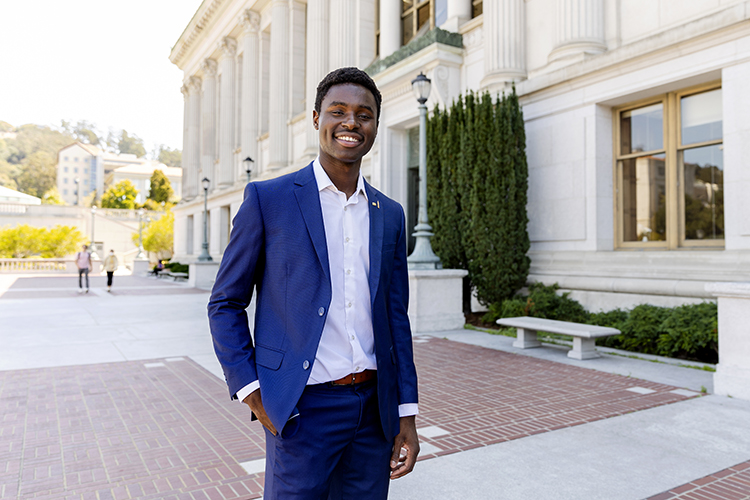
“Welcome to some of the best years of your life!” ASUC President Chaka Tellem told incoming students in his speech at fall convocation. (Photo by Brittany Hosea-Small)
As of this week, to help students better finance a Berkeley education, the Financial Aid and Scholarships Office has disbursed $310 million to 23,126 students for 2022-23 — that’s about $17 million more and 420 more students than received aid at the same time last year.
Increased fundraising enabled these more generous financial aid packages, and dedicated staff helped speed up the distribution to students, said Cruz Grimaldo, associate vice chancellor and director of financial aid and scholarships.
“This is all in an effort to help students, especially those from underrepresented groups, student-parents and transfer students, whose financial needs and instability were impacted and revealed by the pandemic,” she said.

Cal Athletic Director Jim Knowlton, Chancellor Carol Christ and Oski pose in Haas Pavilion following a back-to-school event on Aug. 23 for all Cal athletes. (Photo by Kelley Cox)
A seismically stronger Moffitt Library, free art for students’ walls
In late December, to improve the safety of busy Moffitt Library in the event of an earthquake, the treasured campus staple closed for eight months of reinforcement. All services and staff at the library, which reopened Aug. 22, were moved temporarily to other campus libraries, such as Doe.
On levels one through five of Moffitt, 86 columns received structural carbon fiber reinforcing wrap, then were encased in plaster.
“The process was reminiscent of applying papier-mâché, but when state-of-the art composite material dries, it is stronger than steel. And when covered with new plaster, the carbon fiber material becomes nearly invisible,” said Kyle Gibson, director of communications for UC Berkeley Capital Strategies. “The building columns not only look good as new, they are strong enough to withstand a major earthquake.”
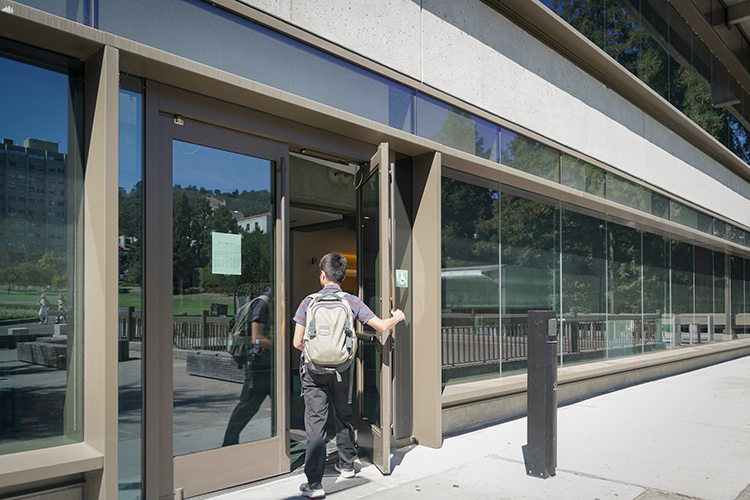
Moffitt Library reopened on Aug. 22 after seismic work that began last December on 86 columns, which received structural carbon fiber reinforcing wrap, then were encased in plaster. (Photo by Jami Smith for the UC Berkeley Library)
Beth Dupuis, senior associate university librarian, said students love being back at Moffitt because of its unique role on campus. Open every day, it has the longest hours of all of Berkeley’s more than 20 libraries — 22 hours a day, five days a week, starting Sept. 12. Moffitt gets about 4,500 visits on an average weekday, is drink- and snack-friendly, has study and meeting spaces with movable walls and furniture, connects underground to the Main (Gardner) Stacks, and offers free lockers, as well as laptops and other electronics for checkout.
“Moffitt Library is designed for students from all majors to feel comfortable, to be inspired to be curious and collaborative, to grow their confidence and skills with new tools and new ideas, to be successful in achieving their academic and personal goals,” said Dupuis.
“Students bring Moffitt to life in ways that are indescribable,” she added, “like air is to lungs.”
The 64-year-old Graphic Arts Loan Collection at the Morrison Library is back after two years of closure during the pandemic. Since 1958, the endowed collection has allowed students, faculty and staff, without charge, to check out up to two framed prints at a time to take home and hang on their walls for the academic year.

The Graphic Arts Loan Collection, a 64-year-old program that loans art to students, faculty and staff, is back this year after a two-year break during the pandemic. Some of the artists represented are Francisco Goya, Rembrandt, Pablo Picasso, Jean Arp, Edward Gorey, Fernand Léger, Max Beckman, Elisabeth Frink, Corita, Carrie Mae Weems, Le Corbusier, Faith Ringgold and Ellsworth Kelly. (Photo by Cade Johnson for the UC Berkeley Library)
Scott Peterson, head of the Morrison Library, said that the nearly 1,000 pieces in the collection “are not reproductions or posters, but art touched by the hand of the artist.” The program was founded on the belief that the best way to foster students’ appreciation for art is for them to live with original prints for an extended period of time.
An exhibit at the Worth Ryder Art Gallery that begins today and runs through Sept. 30 features prints from the collection. Starting Sept. 26, students can check prints out from the gallery; students plus faculty and staff can begin reserving prints from the collection’s website on Oct. 17.
The UC Berkeley Library also reports a hard-fought milestone: The quest to reach open access publishing agreements between the UC system and publishers of UC research has led to deals with all five of the top publishers of UC-authored articles — Elsevier, Springer Nature, Wiley, ACS and IEEE.
“Together, these deals significantly lower the barrier for a broad range of researchers who wish to share their discoveries with people around the globe, at no cost to readers,” said Jeff MacKie-Mason, university librarian, professor and co-chair of the UC systemwide task force on publisher agreements. “The free flow of information allows scientists, nonprofits, government workers and others to more quickly chip away at some of our most pressing problems, improving people’s lives in the process.”
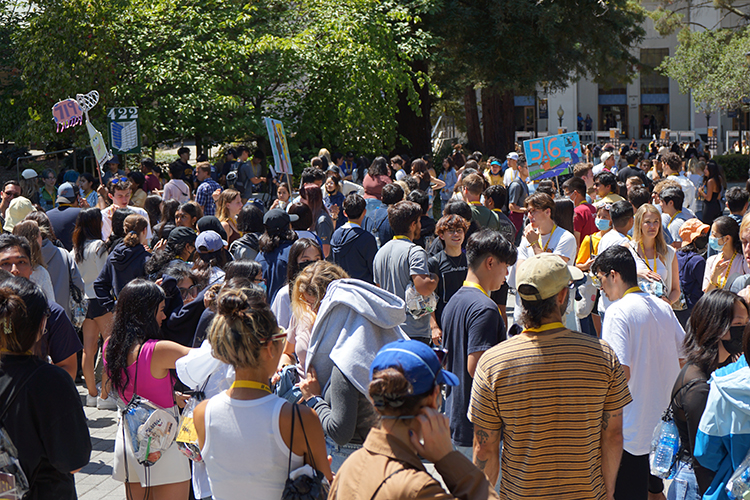
Unlike last fall, fewer masks on faces are a frequent sight outdoors on campus as the semester starts. But indoors, face coverings are strongly recommended. (UC Berkeley photo by Jorge Andrade-Lopez)
Grab-and-go COVID tests
Those aren’t snacks in several new vending machines on campus. Instead, they’re free COVID-19 PCR tests for students, staff and faculty. At the machines — recently installed at the ASUC Student Union, 1st floor; Crossroads Dining Hall, inside Peet’s coffee; and at Sutardja Dai Hall, 1st floor entrance by Yali’s — a phone is needed to scan QR codes to dispense the kits.
Next to each vending machine is a drop box for the samples. A lab picks them up at 3 p.m., Monday through Friday. Lab results are available via eTang within 24 hours.
Aug. 1 was the last day for surveillance testing by University Health Services, which operated sites at the Recreational Sports Facility and Memorial Stadium. COVID-19 vaccines are still available free for students, who should check eTang for open appointments.

New vending machines on campus, like the dark blue one pictured here at the MLK Jr. Student Union, dispense free COVID-19 PCR tests to students, staff and faculty. Completed tests should be placed in the drop boxes next to the machines for daily pick up by a lab. The machine to the right of the blue one sells antigen tests for $7. (UC Berkeley photo by Neil Freese)
Students, staff and faculty with mild COVID-19 symptoms should schedule a COVID test on eTang. For moderate to severe symptoms, students should call the 24/7 University Health Services advice line; faculty and staff should call their health providers for advice.
New vending machines selling $7 antigen tests also can be found next to some of those dispensing PCR tests.
“With a wide availability of both PCR and antigen tests both on- and off-campus, installing these vending machines around campus helps make free PCR testing accessible and convenient to continue to test when needed,” said Dr. Anna Harte, medical director at University Health Services.

Daniela Medina, a graduate of Berkeley’s Master in Social Welfare program, is the new associate director of Berkeley Underground Scholars, one of several programs for historically excluded but highly gifted students to begin receiving unprecedented, ongoing funding from the state. (Photo by Brittany Hosea-Small)
First-ever state funding for historically excluded students
For the first time in California history, the state is providing ongoing funding to Berkeley Hope Scholars, Berkeley Underground Scholars and the Undocumented Student Program and their counterparts across the UC system. Berkeley has played a key role in creating, developing and leading these programs.
Hope Scholars programs — for current and former foster youth, probation youth or those orphaned before age 18 — across the UC system will share $6 million for the 2022-23 year. “This is unprecedented,” said Charly King Beavers, coordinator and academic achievement counselor for Berkeley’s program, which serves about 150 students. “This is a community that’s had so much instability, in terms of their life experiences, and also because of loss of employment and other effects of the pandemic.” A mental health provider is being added to the program this fall, she added, and the state funds will mean money to help students with basic needs, like housing, and to prevent them from experiencing, or care for them through, emergencies.
The Underground Scholars Program and similar programs at other UCs that create a pathway into higher education for incarcerated, formerly incarcerated and system-impacted individuals will share $4 million. At Berkeley, Underground Scholars Executive Director Azadeh Zohrabi led a UC-wide coalition of students who provided testimony at state budget hearings in Sacramento and met with legislators. The funding will allow staff positions in Berkeley’s program, which currently has about 100 students, to become permanent, additional student and career staff to be hired, and students’ care and success to be improved as they enter Berkeley and in their lives beyond it.

The Albany Village Graduate Student Apartments, which will be under construction soon, will house 761 graduate students in single-occupancy bedrooms at below-market rates. (Image by Ayers Saint Gross Architects/American Campus Communities)
For undocumented student programs in the UC system, $5 million was allotted. Berkeley’s Undocumented Student Program has been a UC and national model for the care, support, institutional organizing and success of undocumented students. Today, it provides more than 500 students with holistic counseling, legal and professional development support, and financial assistance.
“These allocations from the state will be ongoing sources of funding for programs that up to now have been majority donor-funded and limited in their abilities to provide the ideal and equitable experience for these highly gifted community members,” said Fabrizio Mejia, associate vice chancellor for equity and inclusion. “They allow us to cover base operational and direct student aid in ways that we hope will energize generous donors to continue and/or start to partner with us to cover additional essential equity needs.
“This is a major next phase for our communities. We are moving toward improvement in students’ well-being and the centering of thriving in their experiences.”
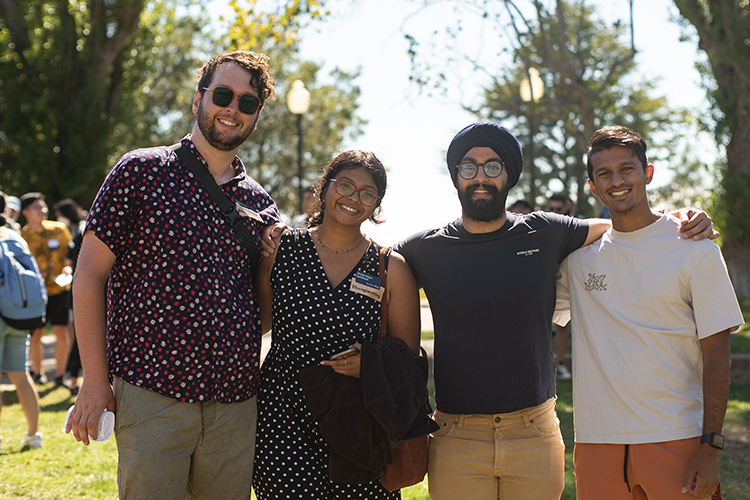
New students at the Coleman Fung Institute for Engineering Leadership pose for a photo during orientation camp prior to the start of classes. (Photo by James Wang)
New places for student communities to call home, expansion of Basic Needs Center
Major additions to Berkeley’s Basic Needs Center, on the lower level of the MLK Jr. Student Union, are in the works. The center will have its first dedicated space — a high-visibility welcome center — on the building’s first floor. Starting Sept. 12, students can drop by to learn how the center can help them with food, housing, finances, health care and other essentials. The Basic Needs Welcome Center will have informal operations this fall, then the space will be remodeled in spring/summer 2023.
The Basic Needs Food Pantry’s space is evolving to create more of a community-centered experience. It will continue to operate in the Student Union with its virtual line through QLess, a system that replaces long, physical lines. Visitors can join the virtual line on their phones, computers and the pantry’s on-site kiosk. The renovated pantry opens Sept. 12, but pantry pop-ups will be held on the Student Union’s first floor between Aug. 30 and Sept. 10.
Next semester, the pantry will continue to expand its grab-and-go meal program, gleaning edible food that otherwise would go to waste from on- and off-campus sources and packaging it for distribution through the welcome center and food pantry.
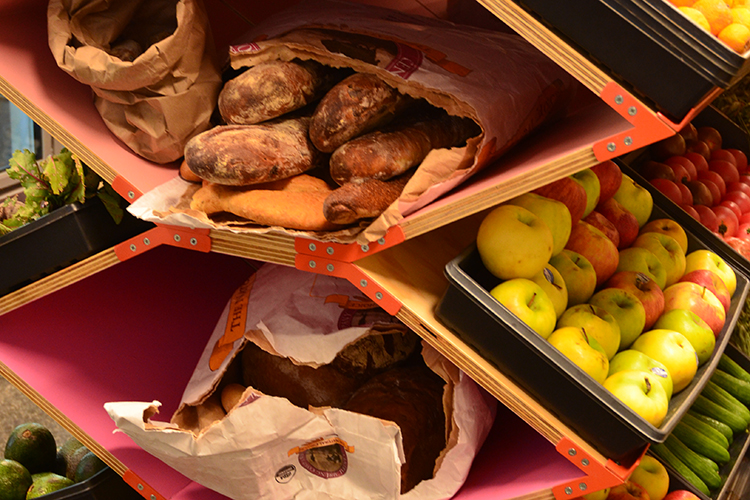
Major additions to the campus’s Basic Needs Center, which provides help to students with food, housing, finances, health care and other essentials, are in the works. They include a new welcome center and an expansion of its food recovery efforts. (UC Berkeley photo by Gretchen Kell)
“By locating Basic Needs Center services in a more accessible and visible spot in the Student Union, we will reach more students in need of support and also destigmatize these essential services,” said Kiyoko Thomas, Basic Needs Center director.
A center for the Latinx community will open in the Hearst Gym, Suite 2, on Sept. 28 at a celebration from 4 to 7 p.m. with music, food and speakers, and additional events will run through the weekend. The Native American Community Center in Anthony Hall is now open, and the Disability Cultural Community Center will have its grand opening on Oct. 25 in Hearst Field Annex D.
A proctoring center for the Disabled Students Program for students who require a low distraction/reduced distraction environment for exams is now open in University Hall. It features adjustable desks, laptops with assistive technology and closed-circuit television, which magnifies text and images placed under a built-in video camera and helps students with low vision to zoom to the desired magnification and enhance color or contrast.

Cal athletic teams took part in a welcome program at Haas Pavilion on Aug. 23 that was followed by a BBQ at Stu Gordon Stadium, where baseball is played. (Cal Athletics photo by Kelley Cox)
Anniversaries galore
Several anniversaries soon will be observed on campus, among them the 50th anniversary of the federal civil rights law Title IX, which prohibits sex-based discrimination in any school or other education program that receives funding from the federal government. It was enacted June 23, 1972.
Two more milestones will be celebrated on Nov. 19 at California Memorial Stadium. One is the 125th Big Game, a decades-old rivalry between the Golden Bears and the Stanford Cardinal. The other is the 40th birthday of “The Play,” which Joe Starkey, the 80-year-old California Golden Bears announcer who will retire at the end of this season, called “the most amazing, sensational, dramatic, heartrending, exciting, thrilling finish in the history of college football.”
“This is certainly shaping up to be a memorable academic year with all three of these anniversaries,” said Jonathan Okanes, interim associate athletics director. In addition to hosting Big Game, he said, Cal Athletics, along with other units on campus, plans to recognize Title IX throughout the academic year, as “this landmark legislation has had a profound effect on intercollegiate athletics.” Cal Athetics has a new webpage dedicated to Title IX’s 50th that includes the history of women’s athletics at Berkeley.

“The Play,” considered the most dramatic finish to a college football game, is 40 years old this fall. The event will be remembered on Nov. 19 at this year’s Big Game, which is celebrating its 125th anniversary. (UC Berkeley photo)
All 200 seats already are taken for Bonnie Morris’ Sports and Gender in U.S. History course, which this fall will explore the social, cultural and political history of American sports, with a focus on sex roles, the body and public racial identities. An expert on Title IX, Morris, the author of the new book, What’s the Score? Twenty-Five Years of Teaching Women’s Sports History, said the reading list includes “several other books that spell out what initiated the whole Title IX movement,” which wasn’t initially about equality in sports, but in academia.
“Generally, students don’t know about the origins of Title IX, and that it got started because of discrimination and bias toward women students and faculty hiring,” said Morris. “It didn’t spill over into sports until later.”
A Sept. 22 Title IX event at the Morrison Library, “Title IX at 50: Looking Back, Looking Forward,” from 4 to 5:30 p.m., is open to the campus community. It will include speakers Lucy Jane Bledsoe, author of No Stopping Us Now, an autobiographical young adult novel about love, basketball and activism; Morris; Charmin Smith, coach of Cal Women’s Basketball; Layshia Clarendon, a WNBA all-star and Cal basketball alumna; and Maddi Wong, a Berkeley student who created a 30-minute documentary, “i am woman,” about gender disparity in sports, which features Smith, Morris and Asha Fletcher, a Cal track and field jumper.
The “Title IX at 50” event is being sponsored by the UC Berkeley Library, the Athletic Study Center, the American Cultures Center and the Department of History.

Patricie Uwase, who received her master’s degree in civil and environmental engineering from Berkeley in 2015, is now the minister of state in the Ministry of Infrastructure in Rwanda. At Berkeley, she was in the international Mastercard Foundation Scholars program, which this year celebrates its 10th anniversary. (Photo by Noah Berger)
This year also is the 10th anniversary of the international Mastercard Foundation Scholars program, which helps young Africans pursue higher education. Since 2012, 131 scholars — 71 undergraduates and 60 master’s degree students — have become Berkeley alumni. In its second phase, the program now is for graduate students only: This year, 27 scholars will be on campus.
The legacy of the program is “paying it forward,” said Martha Saavedra, program manager within the Center for African Studies at Berkeley. “These scholars take the opportunities they’ve had here and translate them into opportunities for others in their home communities.”
For example, after getting their undergraduate degrees at Berkeley in 2019 in global studies, and minoring in global poverty and practice, Vicentia Gyau and Abraham Martei Martey opened the Global Custodians Academy in Ghana and are not only educating, but employing, Ghanaians. And Patricie Uwase, who received her master’s degree in 2015 in civil and environmental engineering, is now the minister of infrastructure in Rwanda.

The Disabled Students Program proctoring center in University Hall is formally open after a soft launch last spring. It has 100 seats and is designed to help students who require a low distraction/reduced distraction environment when taking exams. A proctoring team is there to assist both students and faculty. (Photo by Brittany Hosea-Small)
And there’s more!
Today, between 12 noon and 2 p.m., all are invited to the Welcome Black Celebration in front of the Golden Bear Café at the Black Wednesday Wall, which for decades has been a meeting spot for the campus’s Black community. The event is being sponsored by the African American Student Development Office and the Black Student Union.
Forty years ago, Black students, wanting an official space to greet and support one another, began meeting daily outside the café; the Fannie Lou Hamer Black Resource Center wasn’t open until 2017. A weekly community event, now called Black Wednesday, evolved from this legacy. Each week, a different Black community group hosts the fun and lively gathering — it’s a major student recruitment and retention tool — and provides information about resources and opportunities.
The Black Wednesday Wall “also is the home of the Black Public Arts Project, which celebrates the legacy and contributions that Black students, staff and faculty have made to the UC Berkeley campus,” said Takiyah Jackson, director of the African American Student Development program. “This project was officially launched at the 2021 homecoming celebration and will continue to be built upon each year to have a permanent tribute to the Black community on campus.”
Later this month, construction starts on a new housing community designed just for graduate students. The Albany Village Graduate Student Apartments, across the street from University Village family housing in the city of Albany, about three miles from campus, will open for fall semester 2024 with single-occupancy rooms for 761 graduate students.
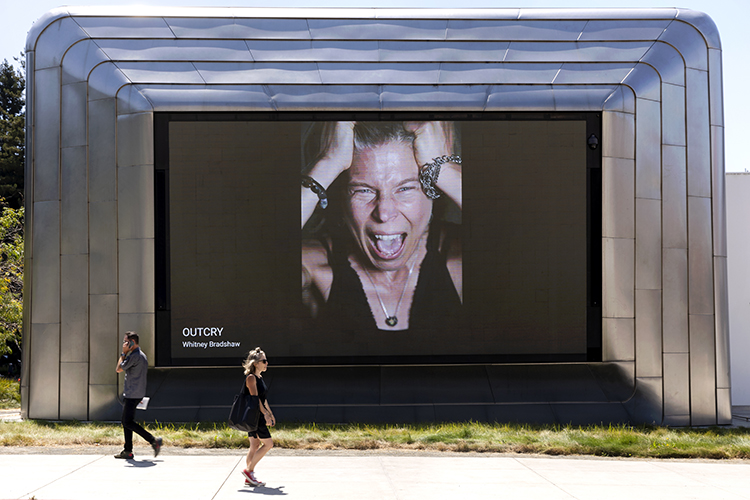
The outdoor screen at the UC Berkeley Art Museum and Pacific Film Archive currently displays a looping rotation of more than 100 images by social worker/photographer Whitney Bradshaw. Her OUTCRY photo series portrays women engaging in unbridled self-expression to vent emotions about sexism, racism and classism. Bradshaw will add to her series when she visits campus on Oct. 15. (Photo by Brittany Hosea-Small)
“If you’re an undergraduate thinking about attending Berkeley as a graduate student, this is good news,” said Gibson in UC Berkeley Capital Strategies. “This project will triple the amount of below-market university housing for single graduate students. Albany Village is a significant step toward our goal of creating more than 8,000 new beds for all types of students by building on every piece of property we own that is relatively close to campus and suitable for housing.”
And, there’s news for women who feel like screaming in response to current events, from the overturning of Roe v. Wade to mass shootings to racial violence. This fall, the UC Berkeley Art Museum and Pacific Film Archive will welcome Chicago-based artist and social worker Whitney Bradshaw, whose celebrated photography series OUTCRY — it portrays women yelling at maximum volume as an act of defiance against patriarchal oppression — has been featured since mid-July on the museum’s massive outdoor screen.
Bradshaw launched the project on the night of the 2018 Women’s March and now has photographed more than 400 women from all walks of life. She plans to add to that collection in Berkeley, where on Oct. 15 there will be an invitation-only “scream session” that includes Berkeley students, whose portraits will be added to the outdoor rotation of OUTCRY photos after the event concludes.
